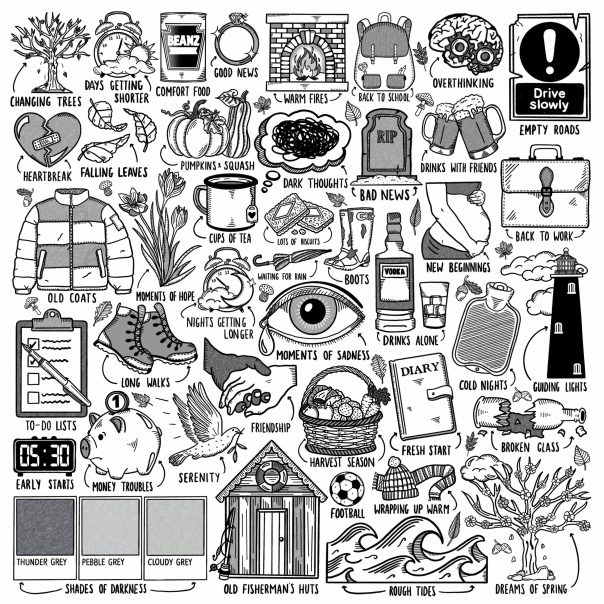ALBUM REVIEW: Ed Sheeran changes with the season on ‘Autumn Variations’

Ed Sheeran, “Autumn Variations.”
The seventh album by Ed Sheeran is a collection of firsts. It’s the first release on Sheeran’s own Gingerbread Man Records and a shift in lyrical inspiration—an 1800s composer named Elgar. Sheeran constructed a 14-track album with each song about a friend in his life.
Autumn Variations
Ed Sheeran
Gingerbread Man, Sept. 29
7/10
Get the album on Amazon Music.
The project was born out of Sheeran’s collaboration with the National’s Aaron Dessner producing his album Subtract (-). It’s also his first mostly acoustic album. That’s significant because many years ago, the artist wanted to do one of those, which he planned to call “Subtract,” but kept getting delayed. And of course, Subtract turned out not to be all acoustic.
Much like Sheeran’s current concurrent tours, if his back catalog of pop hits represents the stadium spectacles, Autumn Variants is the intimate club gigs. The album doubles down on Sheeran’s songwriter sensibilities, dialing in more intricate acoustic sound. With Dessner at the helm, the album hones in on moments of quiet intimacy and the atmospheric space of a ballad.
He delivers opener “Magical” with almost a vocal whisper over a single fingerpicked guitar. Of course the song went viral after he crashed a wedding and Vegas and played it for the bride and groom. But despite the bombs with which it entered the world, it’s still a touching song.
“Is this how it feels to be in love?” asks Sheeran in the chorus.
“England” brings a sense of optimism. It’s an ode to Sheeran’s home and the people who live in its small towns. The instrumentation is distant and quiet, while a light percussive rhythm sits low below the arrangement.
“I find this country of mine gets a bad reputation for being cold and gray,” Sheeran sings, sticking up for the beauty of his homeland.
Songs like “Amazing” are breezy and anthemic, shimmering singalongs that feel recoded right on a stage. Sheeran wrote the songs from his friends’ perspectives, trying to capture what he thought they were feeling at the time. So the album is a varied emotional ride, from joy to sadness and despair.
The dynamic “Plastic Bag” starts slow but really finds its footing once the chorus kicks in, bringing in a vibrant upbeat sound buoyed by a rhythmic but understated loop. “Blue,” meanwhile, is sullen. The poppy “American Town,” which Sheeran debuted at his show in Oakland, is the first track to feature the wordy stylistic lyricism for which Sheeran is known. That personality carries through to “That’s On Me,” though the lyrics have a distinct focus on the more serious topic of stress and mental health.
The quiet “Page” naturally progresses into the driving Americana sounds of “Midnight.” While it may not necessarily have fit in the context of this record, one thing that keeps the the album from being great is the lack of tongue twisters and rhythmic wordiness that has become synonymous with his work. Tracks like “Spring” and “Punchline” are well-constructed but there’s a bit monotonous.
Sheeran again focuses in on depression and mental health on “When Will I Be Alright,” a particularly beautifully performed track with forlorn violin playing accompanying the slow strum of the acoustic guitar. The track delivers a focused intimacy that matches the lyrical content that drives home the message even more. The album closes with a pair of piano-driven ballads in “The Day I Was Born” and “Head > Heels.” The former, Sheeran explained, is about a friend whose birthday is always forgotten due to widely celebrated days on the calendar.
Autumn Variation offers fans plenty of material to dig into. It’s not instantly memorable but it’s a grower and Sheeran should be lauded by taking a creative risk. He and Dessner prove to again be a formidable team.
Follow writer Mike DeWald at Twitter.com/mike_dewald.
